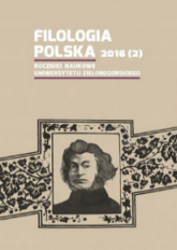Heirs of Lord Steward – the thing about genesis of Sir Thaddeus and Sir Judge Deluty. A contribution to the case study
Keywords
Abstract
Both texts were written nearly at the same time. Czartoryski read the Mickiewicz’s epic after he had written his Sir Judge Deluty [Pan Sędzia Deluty]. There is rather no chance that Mickiewicz knew the Prince’s novel. In such circumstances we cannot assume mutual influences that affected the two writings. The only presumption that may be taken into consideration is that the issuing of Sir Thaddeus [Pan Tadeusz] could have been a reason for Czartoryski to abandon works on his own novel. Nevertheless, the most significant is the fact that the two texts were created in the same time and, furthermore, they are similar in many areas. Therefore, we may ask questions what had caused such a convergence. Was it only a coincidence or did the writers have the same inspiration? Such a common source could have been Lord Steward [Pan Podstoli] by Ignacy Krasicki. There are a lot of analogies between the three mentioned texts on almost all layers of the writings: in the construction of the main characters’ personalities as well as in the group of side figures. Many pictures of life in Soplicowo and Celejowo or plenty of scenes recorded in the books reveal quite clear relevance to the prose by Krasicki. All the matters of Lord Steward concerning ethics, religion, nation or society may be found in later books by Czartoryski and Mickiewicz – they are shown in a very similar manner. The problem needs more thorough analysis which will possibly allow placing the forgotten Czartoryski’s novel within the history of Polish literature and, maybe, finally bring a new view of Sir Thaddeus.
References
Czartoryski A. J. , Pan Sędzia Deluty, oprac. R. Sokoloski, Lublin-Ottawa 2005.
[Google Scholar]
Czartoryski A. J. , Pan Sędzia Deluty. Sceny z pierwszych lat panowania Stanisława Augusta, autograf, rkps Biblioteki XX. Czartoryskich w Krakowie, sygn. 6219 IV.
[Google Scholar]
Czartoryski A. J. , Pan Sędzia Deluty. Sceny z pierwszych lat panowania Stanisława Augusta, kopia, rkps Biblioteki XX. Czartoryskich w Krakowie, sygn. 6220 II.
[Google Scholar]
Grabias-Banaszewska K., Wybrane problemy edycji powieści A. J. Czartoryskiego „Pan Sędzia Deluty”, [w:] Z warsztatu edytora dzieł romantyków, red. M. Bizior-Dombrowska, M. Lutomierski, Toruń 2008.
[Google Scholar]
Herbs S., Potrzeba historii czyli o polskim stylu życia, Warszawa 1978.
[Google Scholar]
Kallenbach J., Adam Mickiewicz, t. 2, Lwów 1923.
[Google Scholar]
Łempiński S., Dlaczego Mickiewicz nazwał Krasickiego Rusinem ?, „Pamiętnik Literacki” 1936.
[Google Scholar]
Łempiński S., Glossy do „Pana Tadeusza”, „Pamiętnik Literacki” 1934.
[Google Scholar]
Mickiewicz A., Dzieła, t. 15: Listy. Część druga 1830-1841, Warszawa 2003.
[Google Scholar]
Mickiewicz A., Pan Tadeusz, oprac. S. Pigoń, Wrocław 1982, BN I, 83.
[Google Scholar]
Niedźwiecki L., Listy wybrane z lat 1832-1839, oprac. S. Makowski, Warszawa 2009.
[Google Scholar]
Niemcewicz J. U., Pamiętniki Juljana Ursyna Niemcewicza: dziennik pobytu za granicą od dnia 21 lipca 1831 r. do 20 maja 1841 r., t. 2, Paryż 1876.
[Google Scholar]
Ogińska L., Pan Tadeusz Adama Mickiewicza, Warszawa 1927.
[Google Scholar]
Płoszowski L., Mickiewicz w korespondencji i zapiskach Leonarda Niedźwieckiego, „Pamiętnik Biblioteki Kórnickiej” 1956, z. 6.
[Google Scholar]
Windakiewicz S., Prolegomena do „Pana Tadeusza”, Kraków 1918.
[Google Scholar]
Zakrzewski B., „Natus est” Pan Tadeusz, Warszawa 2001.
[Google Scholar]
Preview
Downloads
Published
How to Cite
Issue
Section
Categories
Copyright & License

This work is licensed under a Creative Commons Attribution-NonCommercial-NoDerivatives 4.0 International License.
Copyrights (a). In principle, authors who are not employed by the University of Zielona Góra retain the copyright, including publishing rights to the articles, without restrictions.
Copyrights (b). In principle, authors who are employed by the University of Zielona Góra, do not retain the copyright, including publishing rights to the articles. In such cases the copyright holder is the University of Zielona Góra.
ISSN (print)
2450-3584ISSN (online)
3072-1245-
Abstract210













































